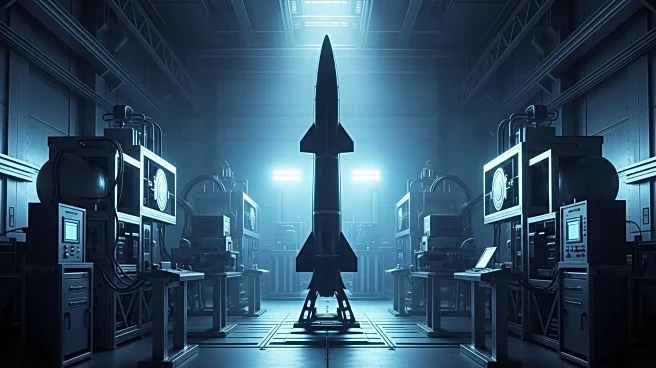What is the story about?
What's Happening?
North Korea announced the completion of its final ground test of a solid-fuel rocket engine for long-range ballistic missiles, marking a significant advancement in its missile capabilities. The test, observed by leader Kim Jong Un, showcased an engine capable of producing 1,971 kilonewtons of thrust, surpassing previous models. This development is part of North Korea's ongoing efforts to enhance its arsenal, potentially threatening the continental United States. Analysts suggest that North Korea may conduct another intercontinental ballistic missile (ICBM) test by the end of the year, coinciding with a major ruling party congress in early 2026. The new engine is intended for future ICBMs, including the Hwasong-20 system, and aims to improve missile mobility and launch readiness.
Why It's Important?
The advancement in North Korea's missile technology poses a strategic challenge to U.S. national security and regional stability. The development of solid-fuel engines enhances North Korea's ability to deploy missiles quickly and covertly, complicating defense strategies for the U.S. and its allies. This progress underscores North Korea's determination to establish itself as a nuclear power, potentially pressuring the U.S. into negotiations from a position of strength. The geopolitical implications are significant, as North Korea strengthens ties with Russia and China, potentially undermining U.S. influence in the region.
What's Next?
North Korea's continued missile development may prompt increased diplomatic and military responses from the U.S. and its allies. The upcoming ruling party congress could reveal new policy directions, influencing future negotiations. Monitoring and intelligence efforts will likely intensify to assess North Korea's capabilities and intentions. The international community may seek to address these developments through diplomatic channels or sanctions.
Beyond the Headlines
North Korea's missile advancements raise ethical and legal questions regarding nuclear proliferation and regional security. The potential for smaller, more mobile ICBMs could alter military strategies and defense postures globally. Long-term shifts in alliances and power dynamics may emerge as North Korea leverages its nuclear capabilities in international relations.
















